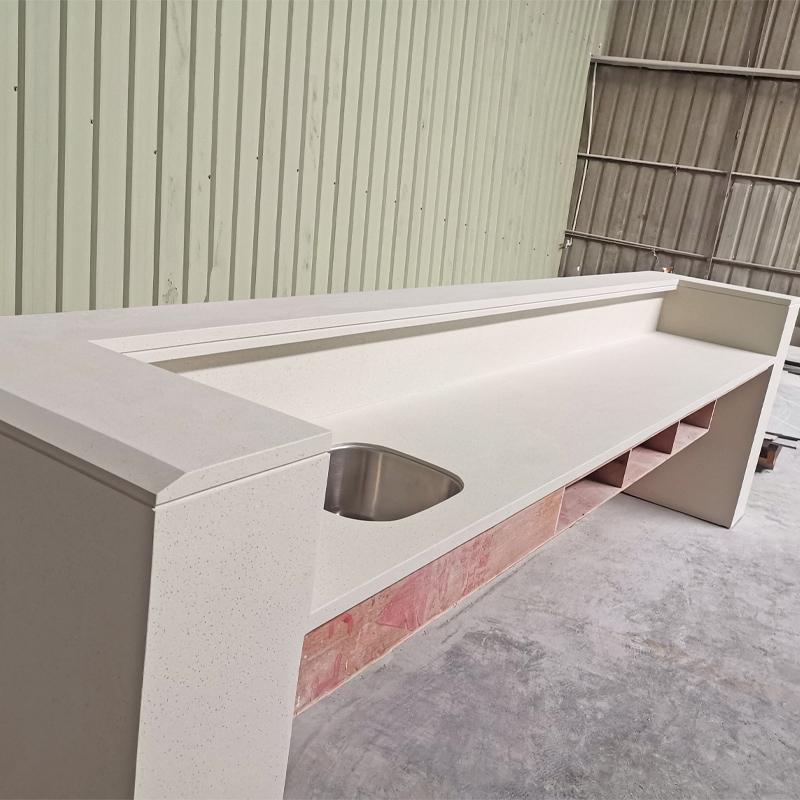
Artificial Stone countertops, commonly referred to as engineered stone surfaces, represent a significant advancement in modern building materials. These surfaces are manufactured through a sophisticated process that combines natural quartz aggregates (typically making up 90-95% of the material by weight) with polymer resins (5-10%) and specialized pigments. The mixture is subjected to intense vibration compaction under vacuum conditions and then cured at high temperatures to create a non-porous, homogeneous slab with exceptional physical properties. The resulting material offers a perfect marriage of natural stone aesthetics and enhanced technical performance, making it one of the most popular choices for both residential and commercial applications worldwide.

Artificial Stone Countertops exhibit several superior physical properties compared to natural stone alternatives:
| Property | Technical Data | Significance |
|---|---|---|
| Compressive Strength | ≥ 40 MPa (5,800 psi) | Exceptional resistance to crushing forces and heavy impact |
| Flexural Strength | ≥ 15 MPa (2,175 psi) | Superior resistance to bending and cracking under load |
| Hardness | 7-8 on Mohs scale | High resistance to scratching and abrasion |
| Water Absorption | ≤ 0.02% by weight | Virtually non-porous surface prevents liquid penetration |
| Thermal Stability | Resists temperatures up to 150°C (302°F) | Withstands moderate heat exposure without damage |
| Chemical Resistance | Resistant to most household chemicals | Unaffected by common acids, alkalis, and solvents |
The material's density typically ranges between 2.4-2.5 g/cm³, contributing to its substantial feel and durability. These technical characteristics translate to practical benefits including exceptional stain resistance, minimal maintenance requirements, and long-term structural integrity even in high-traffic environments.
The versatility of Artificial Stone countertops allows for diverse applications across multiple settings. In residential kitchens, these surfaces provide durable work areas that withstand daily meal preparation activities while maintaining their aesthetic appeal. The non-porous nature prevents bacterial growth and makes them ideal for food preparation surfaces. In bathroom vanities, artificial stone offers resistance to moisture, cosmetics, and toiletries that might damage other materials. Commercial applications include restaurant countertops where hygiene is paramount, reception desks in corporate environments that require both elegance and durability, and laboratory work surfaces where chemical resistance is essential. The material's consistency also allows for Integrated Sinks and backsplashes to be fabricated from the same slab, creating seamless installations that are both functional and visually cohesive.
Beyond horizontal surfaces, artificial stone finds application in vertical elements such as feature walls, shower surrounds, and furniture components. The material can be fabricated into various edge profiles including bullnose, ogee, and waterfall edges, providing design flexibility. Recent advancements have led to the development of ultra-compact slabs as thin as 12mm that can be used for cladding applications while maintaining the material's characteristic durability. The wide range of available colors and patterns, from realistic marble reproductions to bold contemporary designs, ensures compatibility with virtually any architectural style from traditional to modern minimalist.
Proper maintenance of artificial stone countertops ensures their longevity and preserves their appearance. Daily cleaning requires only mild soap or pH-neutral detergent with warm water and a soft cloth. For disinfecting, isopropyl alcohol solutions diluted to 50-70% concentration provide effective sanitation without damaging the surface. Avoid abrasive cleaners, scouring pads, or harsh chemicals containing bleach, ammonia, or trichloroethane, as these can degrade the resin component over time. While the surface is highly heat resistant, always use trivets or hot pads under cooking vessels exceeding 150°C (302°F) to prevent thermal shock. Similarly, although the material is scratch-resistant, use cutting boards rather than cutting directly on the surface to maintain the finish.
For stubborn stains, a plastic putty knife can gently remove dried substances without scratching the surface. Periodic deep cleaning can be performed with specialized stone cleaners designed for engineered surfaces. Unlike natural stone, artificial stone requires no sealing or periodic impregnation treatments due to its non-porous nature. The primary consideration in maintenance is protecting the surface from extreme mechanical or thermal stresses that could compromise the structural integrity. With proper care, artificial stone countertops maintain their like-new appearance for decades, making them one of the most durable surface materials available in the market today.